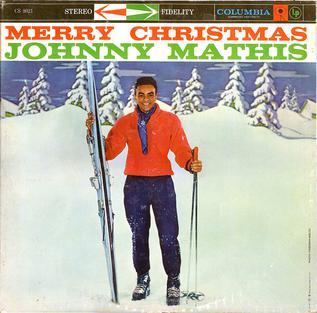
Merry Christmas is the first Christmas album by American pop singer Johnny Mathis and was released by Columbia Records on October 6, 1958. The selections are a mix of traditional Christmas carols and holiday hits.
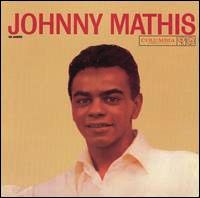
Johnny Mathis is the first studio album by vocalist Johnny Mathis that was released by Columbia Records in 1956. The subtitle A New Sound in Popular Song can be found on the back cover but not on the front of the album or the disc label; in fact, this Mathis LP has been referred to as "the jazz album".

Wonderful, Wonderful is the second album by American pop singer Johnny Mathis. It was released on July 8, 1957, on the Columbia Records label but does not include his hit song of the same name or any of his songs that were released as singles that year. The liner notes on the back of the original album cover proclaim that "he stamps as his very own such familiar rhythm tunes as 'Too Close for Comfort' and 'That Old Black Magic', injects new life in well-known ballads such as 'All Through the Night', gives new hearings to several fine standards that have been neglected in recent years, and even introduces a brand new ballad ."

Johnny's Greatest Hits is a compilation album by vocalist Johnny Mathis that was released by Columbia Records on March 17, 1958, and has been described as the "original greatest-hits package". The LP collected all but one of the songs from the first six singles he recorded, including eight A- and B-sides that made the singles charts in The Billboard as well as three B-sides that did not chart and one new track that was co-written by Mathis but not released as a single.
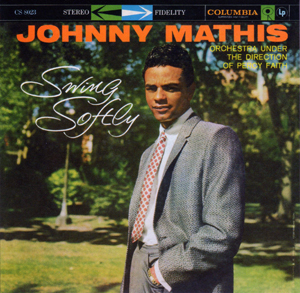
Swing Softly is the fifth album by American pop singer Johnny Mathis that was released on July 28, 1958, by Columbia Records and was a departure from the ballads that accounted for the vast majority of singles and album tracks he had recorded thus far. This project features uptempo arrangements of popular standards, most of which originated in a movie or stage musicals, and a couple of new songs: "To Be in Love" and "Easy to Say ".

Open Fire, Two Guitars is an album by American pop singer Johnny Mathis that was released on January 5, 1959, by Columbia Records on which he opts for guitar and bass accompaniment instead of performing alongside an orchestra. Two new songs are mixed in with covers of popular standards.

Heavenly is an album by American pop singer Johnny Mathis that was released on August 10, 1959, by Columbia Records and marked his return to recording ballads with orchestral accompaniment. Along with the material that others had covered before are two new songs: the title track and "I'll Be Easy to Find".

Faithfully is an album by American pop singer Johnny Mathis that was released on December 21, 1959, by Columbia Records and continues his trend toward covering ballads alongside an orchestra. While his previous LPs usually offered one or two songs that had not been previously recorded, that number on this project leaped to five, and although the other seven selections were established by other artists, even some of those were lesser-known, such as Jeri Southern's number 30 pop hit "You Better Go Now" and the title song from the 1953 film The Blue Gardenia.

Johnny's Mood is an album by American pop singer Johnny Mathis that was released on July 18, 1960, by Columbia Records and mixes new material in with covers of hit standards by other artists.

I'll Buy You a Star is an album by American pop singer Johnny Mathis that was released on February 27, 1961, by Columbia Records and was the first of two album collaborations with arranger and conductor Nelson Riddle. This LP includes both ballads and swinging uptempo material throughout a mix of songs that range from the new to the familiar and obscure.
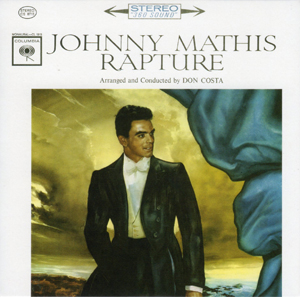
Rapture is an album by American pop singer Johnny Mathis that was released on September 17, 1962, by Columbia Records and returned him to singing a full line-up of the sort of ballads that he was known for.

Romantically is an album by American pop singer Johnny Mathis that was released on November 18, 1963, by Columbia Records and was also the final original studio album recorded by Mathis for the label prior to his moving to Mercury Records. Mathis had recorded exclusively for Columbia from 1956 to 1963. After a brief stint with Mercury, he returned to Columbia in 1967. His first Mercury project, Sounds of Christmas, was actually released six weeks before this one, on October 4.

This Is Love is an album by American pop singer Johnny Mathis, released by Mercury Records on September 18, 1964. The album includes three covers of Nat King Cole recordings as well as two more songs from "Fly Me to the Moon" composer Bart Howard.

So Nice is an album by American pop singer Johnny Mathis released through Mercury Records on September 16, 1966. The singer included a trio of musical numbers from Man of La Mancha in this set as well as songs from Funny Girl, Kismet, and On a Clear Day You Can See Forever, shows that he had recognized on previous releases. Mathis also covers recent imports from France and Brazil and offers a rendition of a 1944 hit record as part of the mix.
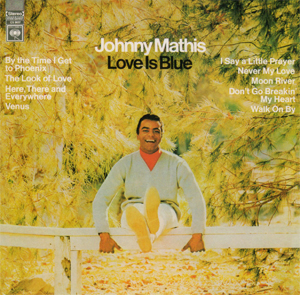
Love Is Blue is an album by American pop singer Johnny Mathis that was released on March 6, 1968, by Columbia Records and adhered even more strictly to the concept of the "cover" album of recent hits than its predecessor in that five of the 10 songs selected for the project were chart hits for the original artists within the previous year and another three had charted within the previous decade. Even the two remaining selections that did not bring chart success to the original artists were by the hit songwriting teams of Burt Bacharach and Hal David and John Lennon and Paul McCartney and left no room for the usual inclusion of some original songs or material from Broadway.

Give Me Your Love for Christmas is the third Christmas album by American pop singer Johnny Mathis and was released by Columbia Records on October 13, 1969. The oldest song selected for this project was the 1934 classic "Santa Claus Is Coming to Town", which meant there were not the traditional hymns that could be found on his previous Christmas outings. He did, however, cover several other contemporary Christmas favorites along with a few new and lesser-known songs, such as the title track, which was a reworking of an unreleased recording of his from 1961, and "Christmas Day", which came from the then-current Broadway musical Promises, Promises. New versions of "Have Yourself a Merry Little Christmas" and "The Little Drummer Boy", which he also recorded in 1963 for his previous Christmas LP, Sounds of Christmas, made the final track list here as well.

Love Story is an album by American pop singer Johnny Mathis that was released on February 10, 1971, by Columbia Records and included a recent Oscar nominee, a flashback to 1967 ("Traces"), a new song by Bacharach & David, a lesser-known one by Goffin & King, and two songs that originated in film scores from 1970 and had lyrics added later: the album closer, "Loss of Love", from Sunflower and the album opener from Love Story, which was subtitled "Where Do I Begin". The norm for Mathis projects from this era was to cover recent hits, and the title track of this one was so recent that the version by Andy Williams began a 13-week run to number nine on Billboard magazine's Hot 100 chart in February 1971, coinciding with the release of this LP.

I'm Coming Home is an album by American pop singer Johnny Mathis that was released on September 21, 1973, by Columbia Records and was mainly composed of material written by the songwriting team of its producer, Thom Bell, and Linda Creed. Unlike several of the Mathis albums before it, I'm Coming Home relied primarily on new songs and included only two covers of established chart hits, both of which were by The Stylistics.

Hold Me, Thrill Me, Kiss Me is an album by American pop singer Johnny Mathis that was released on August 15, 1977, by Columbia Records and found him firmly planted in the cover album genre once again in that no original songs were included. Allmusic's Joe Viglione did feel, however, that "they seem to be trying to cover all the bases here," meaning that it had a variety of selections, including a standard from 1939, a hit that charted in both the 1950s and '60s, a country crossover, and recent offerings from stage and screen.

The Music of Johnny Mathis: A Personal Collection is a box set by American pop singer Johnny Mathis that was released in 1993 by Columbia Records and gave an overview of his career with four CDs containing 86 tracks that he selected himself. In the liner notes he wrote that his "undying gratitude is really to the lyricists and composers of all these memorable songs. Without the words and music I have sung over the years, my career as a singer would not have existed. My thanks is always to these special and gifted people."




















